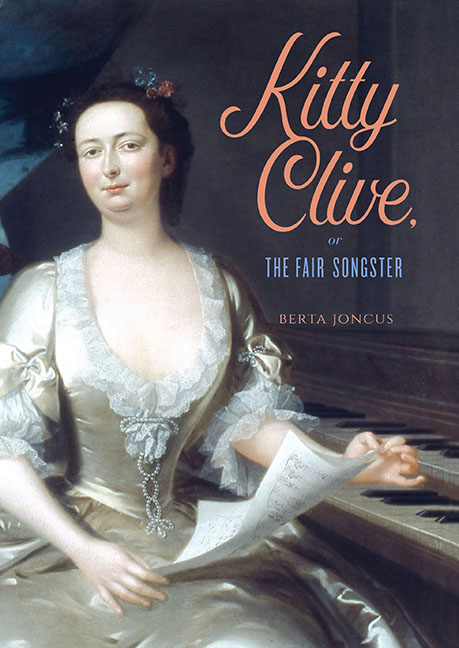Book contents
- Frontmatter
- Dedication
- Contents
- Illustrations
- Preface
- Conventions of Transcription
- 1 The Siren Song: Kitty Clive in the Playhouse
- 2 ‘The Lovely Virgin tun'd her Voice’: Henry Carey and the Production of a Native Songster
- 3 ‘Charm'd with the sprightly Innocence of Nell’: The Metamorphosis of Miss Raftor
- 4 ‘HINT writes, and RAFTOR acts in Drury-lane’: Clive, Fielding, and Theophilus Cibber
- 5 ‘The pious Daughter, and the faithful Wife’: Fielding, Miller, and Clive, 1733–35
- 6 ‘A Likeness where none was to be found’: Contested Images of Clive, 1734–37
- 7 The Patriot Soprano: British Worthies at Drury Lane
- 8 Handel and the Sweet Bird of Drury Lane, 1740–43
- 9 The Case of Mrs. Clive
- 10 Of Scuffles and Rivalries: The Demise of ‘Kitty Cuckoe’
- 11 From Miss Lucy to Mrs. Riot: Voice and Caricature
- 12 Clive on Clive: The Rehearsal: Or, Bays in Petticoats
- 13 Conclusion: The Fair Songster
- Appendix 1 Catherine Clive's Roles 1728–69
- Appendix 2 Lines in Catherine Clive's Repertory 1728–69
- Appendix 3 The Case of Mrs. CLIVE (1744)
- Select Bibliography
- Index
11 - From Miss Lucy to Mrs. Riot: Voice and Caricature
Published online by Cambridge University Press: 20 September 2019
- Frontmatter
- Dedication
- Contents
- Illustrations
- Preface
- Conventions of Transcription
- 1 The Siren Song: Kitty Clive in the Playhouse
- 2 ‘The Lovely Virgin tun'd her Voice’: Henry Carey and the Production of a Native Songster
- 3 ‘Charm'd with the sprightly Innocence of Nell’: The Metamorphosis of Miss Raftor
- 4 ‘HINT writes, and RAFTOR acts in Drury-lane’: Clive, Fielding, and Theophilus Cibber
- 5 ‘The pious Daughter, and the faithful Wife’: Fielding, Miller, and Clive, 1733–35
- 6 ‘A Likeness where none was to be found’: Contested Images of Clive, 1734–37
- 7 The Patriot Soprano: British Worthies at Drury Lane
- 8 Handel and the Sweet Bird of Drury Lane, 1740–43
- 9 The Case of Mrs. Clive
- 10 Of Scuffles and Rivalries: The Demise of ‘Kitty Cuckoe’
- 11 From Miss Lucy to Mrs. Riot: Voice and Caricature
- 12 Clive on Clive: The Rehearsal: Or, Bays in Petticoats
- 13 Conclusion: The Fair Songster
- Appendix 1 Catherine Clive's Roles 1728–69
- Appendix 2 Lines in Catherine Clive's Repertory 1728–69
- Appendix 3 The Case of Mrs. CLIVE (1744)
- Select Bibliography
- Index
Summary
Clive's laurels wither – advice from an unexpected source – a look back at Lucy – Mrs. Riot drinks Lethe's waters – the bid of a gaming woman – Mrs. Edwards leaves the stage – the many forms of Mrs. Riot – caricature from ceramic into song – pastoral with a twist
By the 1747–48 season Clive's reputation was in free fall. Her professional and financial power had become unseemly, and her struggles with managers had imposed upon good taste. Accounts during the 1745–46 season of conflicts, first with Susannah Cibber and then with Peg Woffington, destroyed the earlier impression that, in private, Clive was a ‘dutiful Daughter, a just Wife, a loving Sister, an agreeable Companion, and a Friend to the Oppressed’. In March 1747 a writer registered the implosion of Clive's public image:
Mrs. C[liv]e, who has had her Share of Popularity, and once was esteem'd the Phaenix of the Age, seems now to be of little Consequence; her Laurels are all wither'd; her Friends grown cold; and the repeated Acclamations that us'd to welcome her Appearance, are now no more.
Ah, how fall'n! how chang'd!
The italicized quotation is from Paradise Lost, Book 1, line 84. The reference to Milton, and therefore to Clive's signature role in Comus, was pointed: she had fallen from Goddess of Mirth to object of pity.
By this time, March 1747, even the comedian Samuel Foote – who had squandered his wife's fortune, twice been confined to the Fleet debtors’ prison, and would soon be renowned for his grotesque take-offs of celebrities – felt comfortable condescending to her. In his account of current stage fashion, Foote reminded his readers of Clive's alleged Green Room scuffle: ‘the Lady has … (owing to an Earnestness for the Success of the Business) expressed herself behind the Scenes in too loud and forcible a Manner’. As a result, ‘some part of the Audience’, Foote notes, has ‘not a very favourable Opinion of her Temper’. Beyond her ‘Temper’, Foote says, ‘Mrs. Clive has been a little unhappy in her Choice of some Parts’. A notorious instance of this, though Foote doesn't say so, was her appearance as Bayes in the Duke of Buckingham's Rehearsal for her brother's benefit of May 1743. On this evening, she had performed in breeches.
- Type
- Chapter
- Information
- Kitty Clive, or the Fair Songster , pp. 331 - 377Publisher: Boydell & BrewerPrint publication year: 2019

